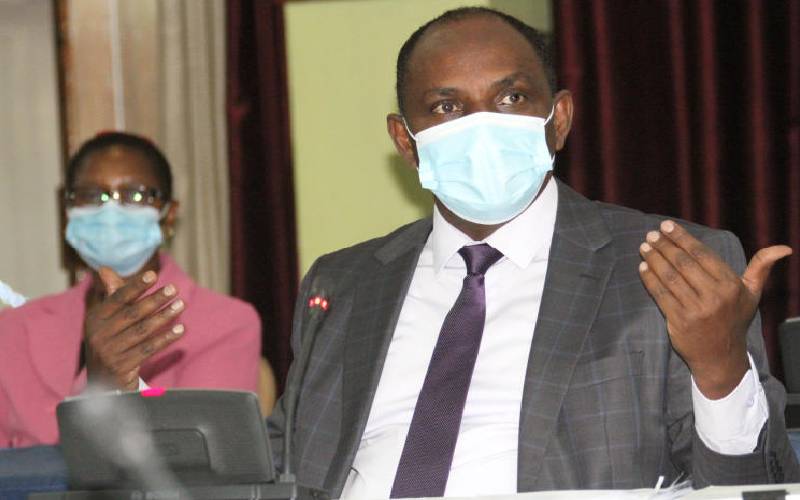
Treasury Cabinet Secretary Ukur Yatani when he appeared before Committee on Finance and National Planning at KICC in Nairobi on December 1, 2020. [David Njaaga, Standard]
The government is planning to merge or dissolve hundreds of State corporations, a move that would see thousands of civil servants lose their jobs.
The latest restructuring, which is expected to start after Christmas, is one of the key conditions of the deal that Kenya has struck with the International Monetary Fund (IMF) for release of crucial funding for budgetary support.
The deal between Kenya and the IMF brings with it echoes of the 1990s-style structural adjustment programmes (SAPs) that saw civil servants sent home as a condition of Kenya receiving aid from the World Bank and IMF.
While the World Bank has not yet given Kenya conditions, it has advised the government to cut wasteful spending and increase its efficiency.
One of the ways to achieve this, said the global lender, is “by leveraging digitalisation to cut operational costs.”
Tough conclusion
Yesterday, Treasury Cabinet Secretary Ukur Yatani said the government had reached the tough conclusion that many State enterprises needed to be restructured “because, at the moment, some of them are actually a burden on the Exchequer.”!
In a statement on November 20, the IMF said Kenyan authorities had agreed to take up either of the highly conditional extended fund facility (EFF) or extended credit facility from the Washington-based institution.
The arrangement, which Yatani said would begin in February, will see Kenya get Sh250 billion in loans from the IMF.
Speaking at a hearing with the National Assembly’s Committee on Finance and National Planning yesterday, the CS said the Covid-19 pandemic has hit government revenues hard, with the Kenya Revenue Authority missing tax collection targets by close to Sh70 billion in the first four months of the current financial year.
As a result, the government has been forced to dive deeper into the debt market to finance its expansive spending plans, and stimulate the economy.
Further, State corporations have seen their revenues dwindle, with a Treasury report showing that more than half of the country’s 247 parastatals registered either a deficit or a loss in the last financial year that ended in June 2020.
The government now plans to restructure most of these 127 loss-making corporations.
As at the end of 2016, there were 69,445 civil servants.
Yatani yesterday said there are parastatals that, despite serving about 10 people a month, continue to incur huge administrative costs, such as paying leases and employees.
“To avoid this … some of the State corporations will be merged, some will be dissolved and some will partner.”
He added, “We are going to work on structural reforms … heavily.”
The CS noted that despite the strategic importance of some of these corporations, they were reeling in major governance challenges.
He said the report of the Presidential Taskforce on Parastatal Reforms was complete and would be launched soon. The task force was headed by former Mandera Central MP Abdikadir Mohamed.
Yatani did not respond directly on a legislator’s question on whether the restructuring would result in job losses but insisted that the process was long overdue.
Besides restructuring State entities, Kenya is also supposed to mobilise more taxes as part of the condition with the IMF.
The lender said it had reached agreements with the government in many areas, but there were some that were yet to be agreed on by the negotiating teams.
“Remaining issues to firm up include the scope of SOE (State-owned enterprises) weaknesses and plans to revise the budget for the financial year 2020-21 to address these and other pressure points, as well as some elements of the medium-term strategy,” said IMF in a statement.
Services disrupted
In its Consolidated National Government Investment Report for the 2019-20 financial year, the Treasury blamed the parastatals’ poor performance on the adverse effects of the coronavirus pandemic.
The biggest loss-maker during the period under review was Kenya Railways Corporation (KRC), whose losses almost tripled from Sh8.47 billion in the previous financial year to Sh24.2 billion.
During the first six months of this year, passenger services offered through the Standard Gauge Railway (SGR), which is under the management of KRC, were disrupted after the government restricted movement into four counties, including Nairobi and Mombasa, routes the train plies.
The overall profitability of commercial State corporations dropped by 91 per cent to Sh5.1 billion, with Yatani saying: “The big drop was mainly attributed to Kenya Railways Corporation.”
Other State firms that did not perform well during this period include Kenya Broadcasting Corporation (KBC), which had a deficit of Sh9.8 billion. It was followed by Nzoia Sugar with a loss of Sh3.48 billion. Most local sugar millers have been struggling, with plans in place for most of them to be privatised.
Kenya Power made a loss of Sh3 billion, which it attributed to the adverse effects of containment measures implemented by the government to curb the spread of Covid-19.
The power distributor, which is listed on the Nairobi Securities Exchange with the government holding a significant stake, received about Sh2 billion in development grants from the Exchequer for public services.
Cement manufacturer East African Portland Cement also registered a loss of Sh2.74 billion in the period under review. With learning institutions remaining closed for the fourth quarter of the previous financial year, the University of Nairobi reported a deficit of Sh2.23 billion.

No comments:
Post a Comment